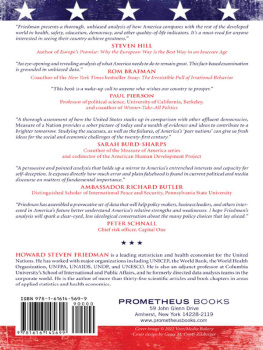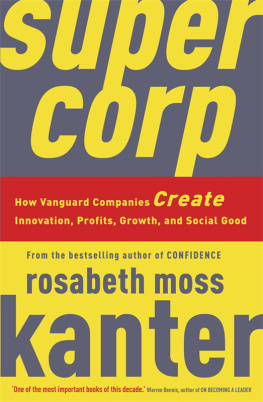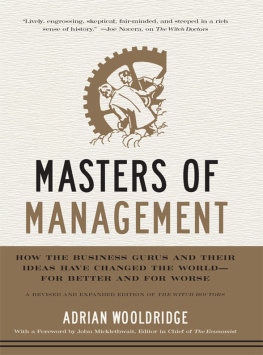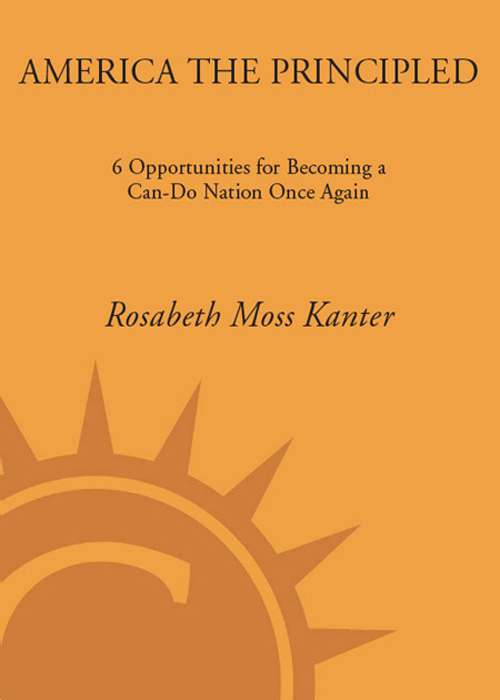
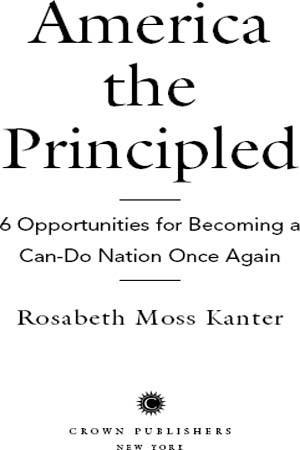
Contents

ONE Securing the Future
Innovation and the White Coat Economy
TWO Pursuing Happiness
Work, Family, and the Woman Question
THREE Growing Good Companies
Can Values-Based Capitalism Replace Imperial Excess?
FOUR Restoring Respect for Government
From Contempt to Competence
FIVE Engaging the World
Globalization, Leadership, and the Rule of Thirds
SIX Building Community
Service and the Spirit of Summer
To Matthew and Melissa,
who have tied the knot, and
for whom I wish the joys of summer year-round
INTRODUCTION

Seasons of Opportunity
Now is the winter of our discontent
WILLIAM SHAKESPEARE,
opening line of
The Tragedy of King Richard III
Y ears ago, I discovered a truth about success in work and in life. Opportunity is a great motivator. People put in the effort today because it leads somewherebecause it helps them get closer to realizing their dreams. The expectation that there are open doors, clear paths, warmer weather, and brighter prospects ahead keeps people going during even the darkest days of the coldest winters. But closed doors and limited options depress aspirations. Without opportunity, people cannot prosper. When people close their minds, fearing the future, they fail to learn how to master new challenges. Closed doors also permit mischief to take place behind them that can distort outcomes. And when countries and companies alike systematically close their doors, they erect barriers to problem-solving and allow a few to succeed at the expense of the many.
Once widely admired as the land of opportunity, America could instead be closing it downunless we create a positive agenda to renew the American spirit. Americans were once known as a people who responded to circumstances, however seemingly adverse, by saying, Yes, we can. The grim opening years of the twenty-first century, however, have been the winter of Americas discontent, when anxieties are so chilling, stresses so burdensome, and major institutions so discredited that it is tempting to retreat behind closed doors. Terrorism, economic recession, corporate scandals, and war have dampened the national mood, despite a recently booming stock market that reached new highs. The 2006 elections shifted national power and perhaps mood, and notes of hope sounded by candidates for public office resonated with the public. But grim realities come to mind quickly, as seemingly intractable problems appear daunting.
Consider these six opportunity-constraining issues that must be faced if we are not to be frozen into perpetual winters of discontent:
For all the talk about the centrality of innovation to the economy, science has been under political attack (whether the issue is biology or global warming) and forced to compete with religious ideology. Too few young Americans achieve excellence in math and science, let alone pursue careers in science and engineering. Furthermore, advanced technology is used only sporadically in two sectors critical for Americas economic future: health care and public education.
For many middle-class families, the burdens of daily life seem more onerous, and even well-educated professionals struggle with issues of work and family, loss of job security (they are not the unemployed but the uneasily employed), and a continuing gender gap.
Corporate financial scandals have caused business leaders to fall precipitously in public esteem and have given zealous prosecutors and regulators an easy targetat the same time that top executive pay has swelled to many hundred times that of the lowest-paid worker. But ending wrongdoing is not enough; many stakeholders demand even higher standards. What more should companies be doing to become good corporate citizens?
Mistrust of government is at an all-time high, and unfortunately, contempt for government or subversion of its powers is prevalent at the highest levels. As the disturbing events surrounding Hurricane Katrina made clear, it is difficult for government to perform effectively, even in basic areas such as public safety and response to natural disasters, without a view that public service is an honorable vocation for the most competent.
The prevailing political ideology that opened the twenty-first century is xenophobic and isolationist, viewing other countries primarily as threats, failing to maximize the value of our national diversity as a nation of immigrants in forging connections to competitor nations (such as China and India), and missing opportunities to cultivate new kinds of leaders who invest in their people.
As Americans separate into antagonistic ideological camps, we struggle to find common ground and the sense of community that once made one nation (under whatever one believed in) the strongest country on earth.
This book offers a positive agenda for dealing with these issues by returning to core American principles. We can use these principles to move forward toward new solutionsin the best American tradition of optimistic leadership for innovation. In that tradition, there is better weather ahead.
That tradition of looking forward to a brighter future has been threatened by negative voices reminding people of threats, not opportunities, and causing them to slam doors on one another. Our can-do nation is being overrun with cant-do/better-not-try pessimists. If bleeding heart liberals were once a political caricature accused of too much compassion and wanting to give away too much, today the caricature might be bleeding ulcer conservatives, who suffer from too much bile because of the things they hate.
Events of the 2000s (terrorism, corruption, war) partly account for this tragic style of thinking. But right-wing fundamentalist ideologies play a large role in shaping a zeitgeist that threatens to make the land of the free and the home of the brave into the land of the screened and the home of the scared. Popular discourse is peppered with images of disaster that are the stuff of tragedy, and our stock of comedy has been depleted. Poking fun has given way to poking huge holes in the social fabric through seemingly endless negativity. We have lost a collective sense of humor, which would allow us to laugh at our pratfalls, correct them, and move on to a happy ending. I call it our gross national comedy deficit.
A belief that disaster looms seemed to surround America in the opening years of the new century. Popular television programs, beginning with Survivor, portray life as a Darwinian jungle of scarce resources in which only some are fit to survive. Struggle-to-the-death metaphors underlie all the knock-offs of Survivor, including the career struggle-to-the-death of The Apprentice. Comedian Steve Harvey, who made the switch from sitcom to reality show, told a reporter, People want to see other people fall on their faces. No matter how much your life sucks, At least Im not that guy. It is indeed a tragedy when people feel better off only if someone else is worse off.
Comedy, in contrast, is sunnier. It involves ludicrous juxta-positions without destruction of the underlying possibilities for improvement. We need comedy to help us understand that things arent always as they appear, that they can shift shape or form, that there are opportunities for change, and that were not stuck inside past decisions.
Next page

